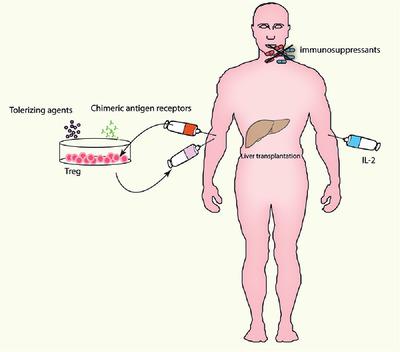当前位置:
X-MOL 学术
›
Eur. J. Immunol.
›
论文详情
Our official English website, www.x-mol.net, welcomes your feedback! (Note: you will need to create a separate account there.)
Advances in Liver Transplantation: where are we in the pursuit of transplantation tolerance?
European Journal of Immunology ( IF 5.4 ) Pub Date : 2021-08-10 , DOI: 10.1002/eji.202048875 Niloufar Safinia 1 , Trishan Vaikunthanathan 2 , Robert Ian Lechler 1 , Alberto Sanchez-Fueyo 2 , Giovanna Lombardi 1
European Journal of Immunology ( IF 5.4 ) Pub Date : 2021-08-10 , DOI: 10.1002/eji.202048875 Niloufar Safinia 1 , Trishan Vaikunthanathan 2 , Robert Ian Lechler 1 , Alberto Sanchez-Fueyo 2 , Giovanna Lombardi 1
Affiliation

|
Liver transplantation is the ultimate treatment option for end-stage liver disease. Breakthroughs in surgical practice and immunosuppression have seen considerable advancements in survival after transplantation. However, the intricate management of immunosuppressive regimens, balancing desired immunological quiescence while minimizing toxicity has proven challenging. Diminishing improvements in long-term morbidity and mortality have been inextricably linked with the protracted use of these medications. As such, there is now enormous interest to devise protocols that will allow us to minimize or completely withdraw immunosuppressants after transplantation. Immunosuppression withdrawal trials have proved the reality of tolerance following liver transplantation, however, without intervention will only occur after several years at the risk of potential cumulative immunosuppression-related morbidity. Focus has now been directed at accelerating this phenomenon through tolerance-inducing strategies. In this regard, efforts have seen the use of regulatory cell immunotherapy. Here we focus particularly on regulatory T cells, discussing preclinical data that propagated several clinical trials of adoptive cell therapy in liver transplantation. Furthermore, we describe efforts to further optimize the specificity and survival of regulatory cell therapy guided by concurrent immunomonitoring studies and the development of novel technologies including chimeric antigen receptors and co-administration of low-dose IL-2.
中文翻译:

肝移植的进展:我们在哪里追求移植耐受?
肝移植是终末期肝病的最终治疗选择。外科手术和免疫抑制方面的突破已经在移植后的存活率方面取得了相当大的进步。然而,免疫抑制方案的复杂管理、平衡所需的免疫静止和最小化毒性已被证明具有挑战性。长期发病率和死亡率的降低与这些药物的长期使用有着千丝万缕的联系。因此,现在人们对设计允许我们在移植后最大限度地减少或完全停用免疫抑制剂的方案产生了极大的兴趣。免疫抑制戒断试验证明了肝移植后耐受性的真实性,然而,如果不进行干预,数年后只会发生潜在的累积性免疫抑制相关病态的风险。现在的重点是通过容忍诱导策略加速这一现象。在这方面,努力已经看到了调节细胞免疫疗法的使用。在这里,我们特别关注调节性 T 细胞,讨论传播过继细胞疗法在肝移植中的几项临床试验的临床前数据。此外,我们还描述了在并行免疫监测研究和新技术开发(包括嵌合抗原受体和低剂量 IL-2 的共同给药)的指导下进一步优化调节细胞疗法的特异性和存活率的努力。现在的重点是通过容忍诱导策略加速这一现象。在这方面,努力已经看到了调节细胞免疫疗法的使用。在这里,我们特别关注调节性 T 细胞,讨论传播过继细胞疗法在肝移植中的几项临床试验的临床前数据。此外,我们还描述了在并行免疫监测研究和新技术开发(包括嵌合抗原受体和低剂量 IL-2 的共同给药)的指导下进一步优化调节细胞疗法的特异性和存活率的努力。现在的重点是通过容忍诱导策略加速这一现象。在这方面,努力已经看到了调节细胞免疫疗法的使用。在这里,我们特别关注调节性 T 细胞,讨论传播过继细胞疗法在肝移植中的几项临床试验的临床前数据。此外,我们还描述了在并行免疫监测研究和新技术开发(包括嵌合抗原受体和低剂量 IL-2 的共同给药)的指导下进一步优化调节细胞疗法的特异性和存活率的努力。讨论在肝移植中传播过继细胞疗法的几项临床试验的临床前数据。此外,我们还描述了在并行免疫监测研究和新技术开发(包括嵌合抗原受体和低剂量 IL-2 的共同给药)的指导下进一步优化调节细胞疗法的特异性和存活率的努力。讨论在肝移植中传播过继细胞疗法的几项临床试验的临床前数据。此外,我们还描述了在并行免疫监测研究和新技术开发(包括嵌合抗原受体和低剂量 IL-2 的共同给药)的指导下进一步优化调节细胞疗法的特异性和存活率的努力。
更新日期:2021-10-06
中文翻译:

肝移植的进展:我们在哪里追求移植耐受?
肝移植是终末期肝病的最终治疗选择。外科手术和免疫抑制方面的突破已经在移植后的存活率方面取得了相当大的进步。然而,免疫抑制方案的复杂管理、平衡所需的免疫静止和最小化毒性已被证明具有挑战性。长期发病率和死亡率的降低与这些药物的长期使用有着千丝万缕的联系。因此,现在人们对设计允许我们在移植后最大限度地减少或完全停用免疫抑制剂的方案产生了极大的兴趣。免疫抑制戒断试验证明了肝移植后耐受性的真实性,然而,如果不进行干预,数年后只会发生潜在的累积性免疫抑制相关病态的风险。现在的重点是通过容忍诱导策略加速这一现象。在这方面,努力已经看到了调节细胞免疫疗法的使用。在这里,我们特别关注调节性 T 细胞,讨论传播过继细胞疗法在肝移植中的几项临床试验的临床前数据。此外,我们还描述了在并行免疫监测研究和新技术开发(包括嵌合抗原受体和低剂量 IL-2 的共同给药)的指导下进一步优化调节细胞疗法的特异性和存活率的努力。现在的重点是通过容忍诱导策略加速这一现象。在这方面,努力已经看到了调节细胞免疫疗法的使用。在这里,我们特别关注调节性 T 细胞,讨论传播过继细胞疗法在肝移植中的几项临床试验的临床前数据。此外,我们还描述了在并行免疫监测研究和新技术开发(包括嵌合抗原受体和低剂量 IL-2 的共同给药)的指导下进一步优化调节细胞疗法的特异性和存活率的努力。现在的重点是通过容忍诱导策略加速这一现象。在这方面,努力已经看到了调节细胞免疫疗法的使用。在这里,我们特别关注调节性 T 细胞,讨论传播过继细胞疗法在肝移植中的几项临床试验的临床前数据。此外,我们还描述了在并行免疫监测研究和新技术开发(包括嵌合抗原受体和低剂量 IL-2 的共同给药)的指导下进一步优化调节细胞疗法的特异性和存活率的努力。讨论在肝移植中传播过继细胞疗法的几项临床试验的临床前数据。此外,我们还描述了在并行免疫监测研究和新技术开发(包括嵌合抗原受体和低剂量 IL-2 的共同给药)的指导下进一步优化调节细胞疗法的特异性和存活率的努力。讨论在肝移植中传播过继细胞疗法的几项临床试验的临床前数据。此外,我们还描述了在并行免疫监测研究和新技术开发(包括嵌合抗原受体和低剂量 IL-2 的共同给药)的指导下进一步优化调节细胞疗法的特异性和存活率的努力。


























 京公网安备 11010802027423号
京公网安备 11010802027423号